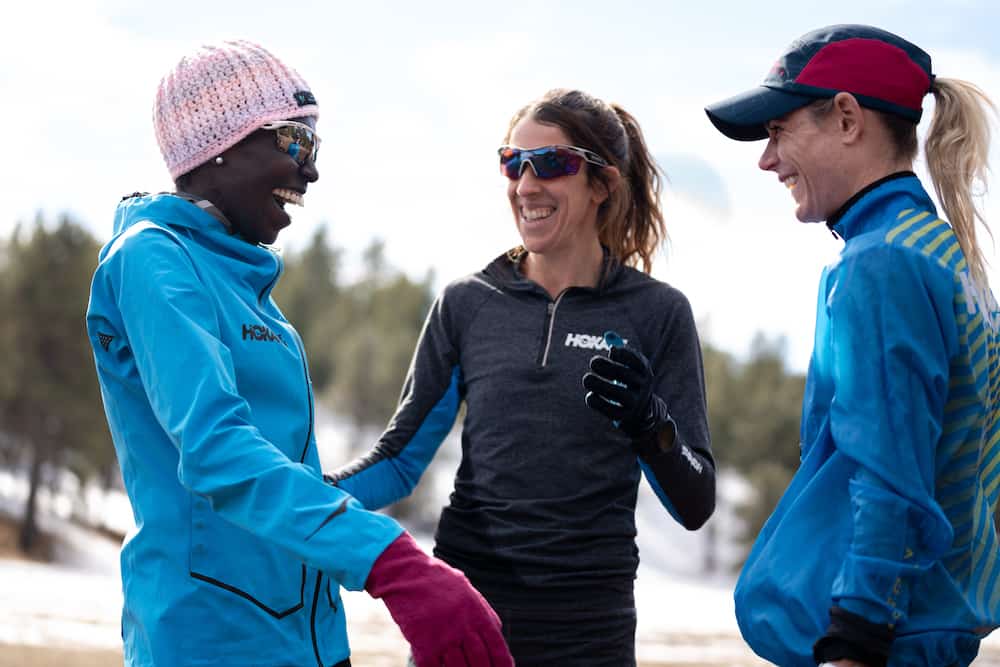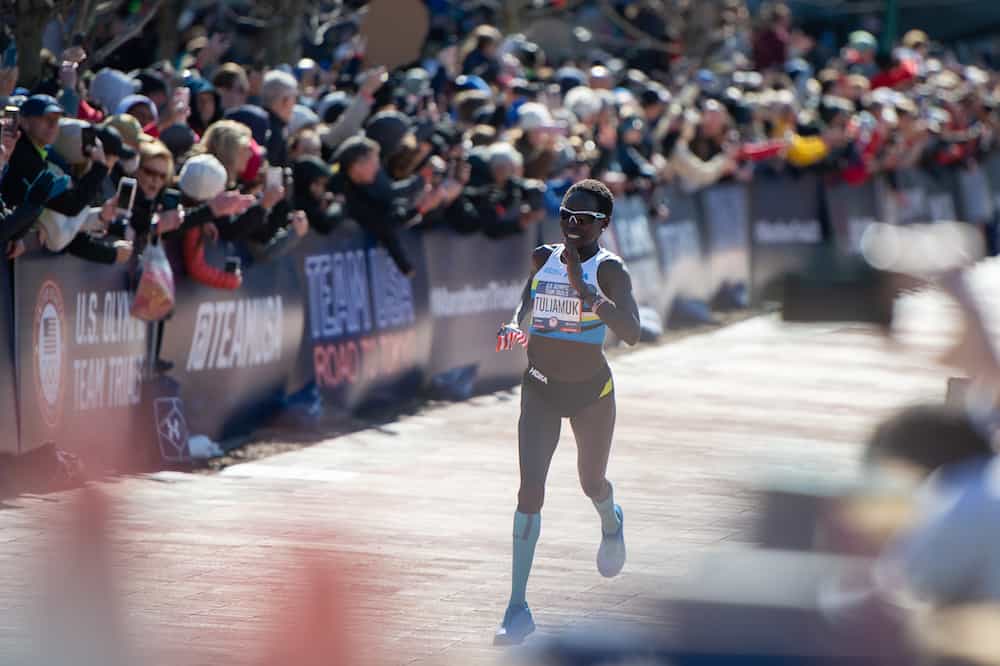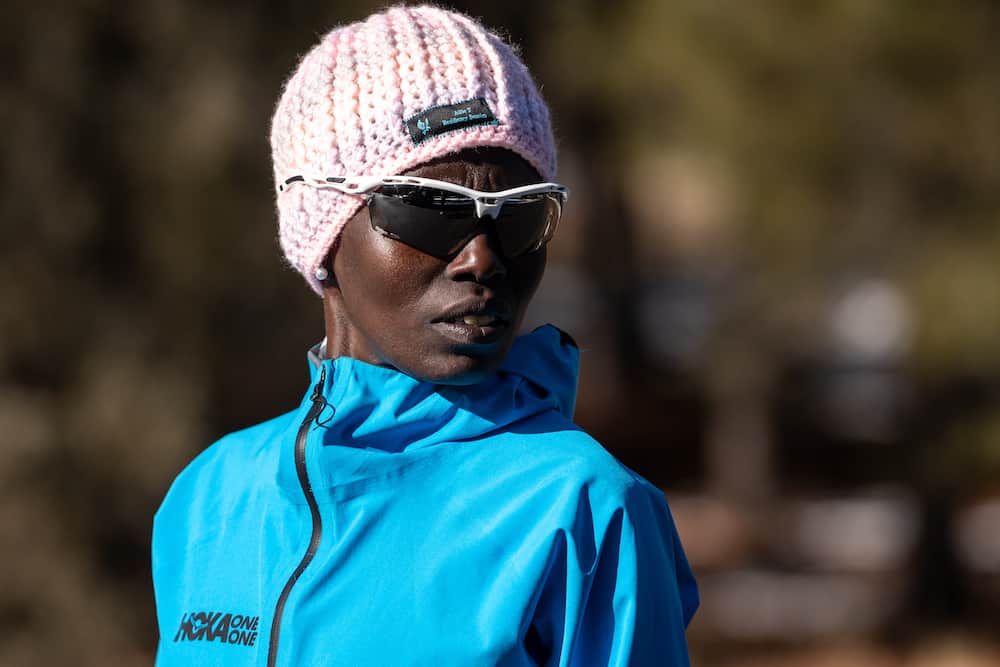An Underdog’s Road to the Top | My Conversation With Aliphine Tuliamuk
by Chase Parnell — April 13, 2020
When Aliphine Tuliamuk, the 2020 Olympic Marathon Trials champion, tells me she’s lazy, I analogize it to the father of impressionism, Claude Monet, saying he doesn’t have an eye for beauty. You do not reach the pinnacle of elite marathoning without a herculean capacity for hard work just as you don’t create your own art epoch without absolute mastery.
When she tells me she’s always been an underdog, I get the sense she’s talking about more than just running. The underdog by nature is safe; you aren’t supposed to win so there’s nothing to lose. What we witnessed on February 29th through the streets of Atlanta, when Aliphine broke away from the pack with Molly Seidel with five miles to go, blasting the last 10k in 34:22 (5:32 per mile average) to win on the toughest marathon course these women had ever seen, we witnessed Aliphine’s watershed moment. We watched a woman transform into something new.
In order to understand how this self-deprecating lazy underdog could will herself to win the Olympic Marathon Trials and steal the heart of America, we have to go back. Way back.
Growing Up In Kenya
Aliphine grew up on a farm in a remote village in northwest Kenya. She is one of 32 children and shares the same parents with eight of them. Her father is a polygamist, which is common in her culture. He’s also a farmer and landholder so they weren’t actually poor by Kenyan standards when Aliphine was little. Yet being financially stable doesn’t mean her childhood was without tragedy. She lost two younger brothers to medical issues that they could’ve recovered from if they had access to proper medical facilities and care. Aliphine has been open about memories of seeing her brother’s body after he passed. These losses are what ultimately led Aliphine to want to become a nurse.
Growing up, Aliphine’s own two feet were her mode of transportation. Barefoot and peers in tow, she ran on Kenya’s red clay, all over the hill country of West Pokot County. She ran to school, ran to the supermarket, and ran to get water. That’s how she figured out she had a talent for running. Her friends would fall off the pace and she couldn’t help but take notice. This running thing, that wasn’t even a sport in her mind then, came easier to her than to others.
Eventually her uncle noticed this talent too and convinced Aliphine to live with him and his family so she could train under his tutelage. At age 15, Aliphine represented Kenya at the 2005 World Junior Cross Country Championships in France. Hello world.
The race results show that the top ten women were Kenyan or Ethiopian. Aliphine was 9th place overall yet last on her team of six Kenyan runners. But don’t let that fool you. To put this race in context, Jenny Simpson (then Barringer), who has gone on to become one of America’s greatest distance runners, was also in this race. She was a full two and a half years older than Aliphine at the time, and yet Simpson finished 47th place and was almost two minutes behind Aliphine on the 6 kilometer course. Needless to say, Aliphine’s talent was prodigious.
Surprisingly, she actually stepped away from running to focus on academics after World Juniors in France. She says she got really out of shape and put on some weight. It was then that her uncle intervened again and suggested she apply for athletic scholarships to the United States. She says she must not have looked like much when the Iowa State coach visited Kenya to watch her run. He saw enough to offer her a full ride. If she’d once been the 9th fastest Junior in the world, maybe she could return to form and help bring some titles to the Cyclones of Ames, Iowa.
Collegiate & Post-Collegiate Running
Aliphine could write the book on culture shock in America. Take a second to imagine growing up in rural Kenya and being transplanted to a college town in the midwest. Foreign bus schedules, buffet dining, indecipherable social queues, academic expectations. College students in Kenya are expected to dress and act professionally, she said, in America you can wear sweatpants and eat in class! Her saving grace was that she had a few African teammates that showed her the ropes of living abroad.
She spent two years in Iowa before transferring to Wichita State to finish undergrad. She says Iowa State didn’t have a nursing program, which is what she really wanted to study, but she also admits that the team dynamics might not have been a good fit for her anyways. She needed to do what was right for her despite the pressures of staying with the school that recruited her. She followed her internal compass, a theme that has served her well in life.
It’s safe to say the decision paid off. Aliphine went on to set school records in the indoor 3k and 5k and outdoor 5k and 10k, which she still holds to this day. While she did run extraordinarily fast times, she didn’t win any major NCAA titles, so when she graduated, the sponsors weren’t exactly flocking as she’d hoped; one of many financial reality checks she’d have to overcome.
After finding some success racing on the roads she landed with a training group in Santa Fe, New Mexico and signed a professional contract with New Balance. The validation was nice, but it didn’t exactly pay the bills. She worked as a nurse’s assistant with the elderly so that the pressure of winning prize money was lessened.
When her contract was up with New Balance, she again followed that internal compass and told her agent she wanted to explore her options. Enter Hoka-sponsored Northern Arizona Elite (NAZ). Aliphine met two members of the team, Kellyn Taylor and Steph Bruce, at the New York City Marathon the prior fall. She said they kicked her butt and it got her thinking about what was in the water over in Flagstaff. She went for a visit to meet the squad and head coach Ben Rosario. The team dynamics and training philosophies felt like the yin to her yang, so with Hoka’s help, Aliphine joined NAZ and kept the running dream alive.

Photo Credit: Hoka One One
The Olympic Trials in Atlanta
Coach Rosario woke up early the morning of the trials. With six of his athletes in the field, tensions were understandably high. He knew he wasn’t going to fall back asleep so he put on a light-hearted Netflix documentary: Hiroshima. He told Jon Gault of LetsRun that he’s a big World War II buff. It makes me wonder if war enthusiasts make good coaches. Running is often compared to going into battle, lots of dying at the end of races.
I decide to tease some of this out by asking Aliphine what differentiates a good coach from a great coach. She says, “I think a great coach is one who cares about his athletes; listens to them. It’s a partnership. You talk to the athlete, you see how they feel, you see what they think about the workout you want to give them, and you have to be flexible,” she said. “Also, you need to treat each athlete like they’re the only thing that matters. Ben is able to talk to you in a way that makes you feel like he really values you as a person, and as an athlete, and that he believes in you, regardless of your performances or who else is on the team and how good they are.”
Rosario sounds more like a master of diplomacy than a five-star general.
Before the trials, a commentator I respect said Rosario needed a big performance from his team. Their sponsor, Hoka, invested in NAZ back in 2014 with the intention of developing Olympians. The 2016 trials came and went without sending anyone to Rio. Was the team in jeopardy in any way if 2020 also didn’t produce an Olympian? Aliphine said she didn’t feel any of that type of pressure. “If I can do what I’m capable of doing, it will take care of everything else and check all the boxes. If I perform to my best, it means I’ve done well for my team, my coach, for my sponsor, for everything. You just have to do you; you have to focus on what you can do.”
If you haven’t heard Aliphine speak, let’s just say she’s a fast talker. She packs a lot into these 60-90 second runs of dialogue. It’s quite impressive, but if you’re not paying close attention, you’ll miss some of the gold buried in what she says because she can so quickly move from one wisdom bomb to the next.

Rise & Grind Newsletter
Weekly email with all our new content, life updates, and podcast/article of the week recommendations.
I told her I wasn’t going to make her recount every moment of the trials race. We’re six weeks out, she’s done a million interviews, and she already put out a great play-by-play thread on Twitter.
But I did want to know what’s still satisfying to her looking back on the experience now. What imagery comes to the forefront? “It still doesn’t feel like it was me. Maybe this is how I have always been. Maybe I’ve never taken time to appreciate the things that I have had in my life,” she said. “Maybe its because I’m still hungry for more. Maybe I don’t want to celebrate the win at the trials too much because maybe to me that would be me saying I’ve made it in life.”
Okay, part of me wants to shake her and say, It was you! YOU did it! Enjoy it! Be proud! But then again, maybe it’s exactly this type of refusal to let the win sink in that keeps the fire burning. What would I know about the psyche of a world-class elite? She’s been telling herself for so long that if she’s going to win, it’ll be a cinderella story, a long shot, and that mentality finally paid off big time at the trials. The question over the long run though, is whether the well is deeper for an underdog or an alpha dog mentality. Will Aliphine develop a similar aura as, say, a Shalane Flanagan or a Desi Linden? And if so, what would that kind of confidence do for her running?
One thing is certain. We want to see more of Aliphine on top of podiums; we want to see more of that giant smile that lit up our TV screens on February 29th. Of all the post-trials podcasts with Aliphine, I thought her interview with Kara Goucher and Shanna Burnette on the Clean Sport Podcast was the most impactful. Kara really drilled home that no matter what happens at the Olympics, she wanted Aliphine to know that she has already contributed so much to the sport, she already is inspiring the next generation of runners; she’s a bright light of hope regardless of whether she comes back with a medal. As a past Olympian herself, Kara knows the associative pressure of the Olympic Games and was lifting that weight off Aliphine’s shoulders. You don’t have to win gold for us to see you.

Photo Credit: Hoka One One
When I pressed Aliphine on confidence building, I did sense a coagulation of spirit happening, a new inner narrative, “What really stands out to me is that I didn’t just go to the trials and when things got hard, give up. I fought my way in,” she said. “I went there and believed that I could win. It didn’t matter who was in the race. And I didn’t just make the team, I won the damn race!”
I almost blurted out, YOU GO GIRL!
Post-Trials Recovery and the Postponement of the Olympics
Aliphine said she was recovered within two days of the trials but still followed the advice of her coach and took 14 days completely off before starting up some easy running. She has already progressed up to a 14 mile long run and on April 8th she did her first workout since the trials, 20 minutes alternating one minute hard one minute easy. Her final rep at 5:05 mile pace got the blood pumping.
She says a normal day for her now consists of waking up, crocheting her Allie T Resiliency Beanies, drinking coffee and procrastinating her run as long as possible. Sometimes she waits until as late as 7pm to start.
I asked Aliphine how she’s going to stay motivated without any races in the near future. “I find comfort in knowing that the reason I’m not racing is not because I did something wrong or because I’m injured. Everyone is in the same boat,” she said. “Right now, I’m not putting too much effort or thinking into my runs, I just go do what my body feels like doing.”
The year-long postponement of the Olympics does complicate things. Sure, she will be able to run a fall and maybe even a spring marathon and build experience, but a lot can happen in a year. Injuries and putting the training jigsaw puzzle together are probably the biggest variables. She was incredibly fit at the trials, and sadly, we’ll never know what would’ve happened if she were able to build off that momentum and go straight into the Olympic marathon that was originally scheduled for August 8th in Sapporo, Japan.
It’s more than the disappointment on a competitive level for Aliphine. “When they announced that the Olympics were going to be postponed,” she said, “I just felt, you know, it broke my heart because I know I had worked very very hard to make this team and I had a lot of plans that were revolving around this year, and now that the Olympics have been postponed, I’ll have to postpone everything else and that is very hard.” I didn’t press her to explain because I already knew what she was talking about. It was reported in a Women’s Running article on April 1st that she finally planned to return to Kenya in April after not seeing her family for three years. Also, she wanted to start a family with her partner Tim after the Olympics were over. Now, these major life moments would have to wait another year.
Coronavirus Hits Close to Home
There aren’t any coronavirus cases that she knows of in the village she grew up in, which is good, she says, “because they don’t have the resources to save people there.” The majority of cases and deaths are localized to Nairobi and Mombasa, she said, Kenya’s major urban centers.
The stakes could not be higher. Her father has respiratory issues; he recently had pneumonia, also tuberculosis. They had to extract fluid from his lungs. If he contracted the virus, he’d have a tough fight ahead of him. Also close to home, her boyfriend Tim is a physician’s assistant at an urgent care clinic in Santa Fe. He recently came home saying he thought he might’ve treated someone with Covid-19 that day. She asked if he had the protective gear he needed. The answer was no. She said all this came to a head during a recent interview, “I had all these emotions of the Olympics being postponed that I was bottling, and I have my partner on the frontline, and I have my Dad and the rest of my other family members; I felt trapped. I felt like I didn’t have an outlet. And every time I talk to someone about it, I have this emotion and a really big lump in my throat, and I can’t shake it. I can’t shake it off until I go out for a run.”
I tell her I think a lot of people are leaning hard on their running right now. “It is definitely helping,” she says, “I don’t know what I would do without running. Not just for a living; for day to day life.”
More Than Just A Runner
Aliphine likes to say she’s just like everyone else, that she’s no different from you and me. But might that be just another version of the underdog mentality? I don’t know, winning the Olympic Trials seems pretty exceptional to me, pretty extraordinary. And honestly, it might have been the mental strength to pull it off that was even more impressive than the physical feat. I think there were ladies on that starting line who were just as fit, have just as much talent, but they didn’t keep it together between the ears like Aliphine did.

Photo Credit: Hoka One One
Maybe she won’t ever view herself as the alpha or the favorite—the one to beat—and maybe that’s totally fine. The alpha mentality requires believing others are somehow beneath you, inferior in some way. I don’t think she has the gall for that. Her humility won’t allow it and that’s one of the things we’ve all come to love about her.
In my mind, I can see Aliphine nestled up on her couch with a morning blend and a pile of yarn, spending long hours quarantined alone in Santa Fe while her boyfriend is at the clinic. She’s pumping out six to eight Allie T Resiliency Beanies a day, trying desperately to keep up with all the orders that’ve come through since the trials. It’s a meditative practice, it’s therapeutic, but it’s also her way of tangibly connecting with the people that’ve found hope in her story.
The beanies are more than simple head warmers. They’ve become her service, her strength and heart objectified. “Right now,” she said, followed by an uncharacteristic pause in speech, “people need resilience more than ever.”

We Need Your Help.
If you enjoyed this article, consider supporting Treeline Journal through Patreon for as little as $2 a month. Every little bit goes a long way!





1 thought on “An Underdog’s Road to the Top | My Conversation With Aliphine Tuliamuk”